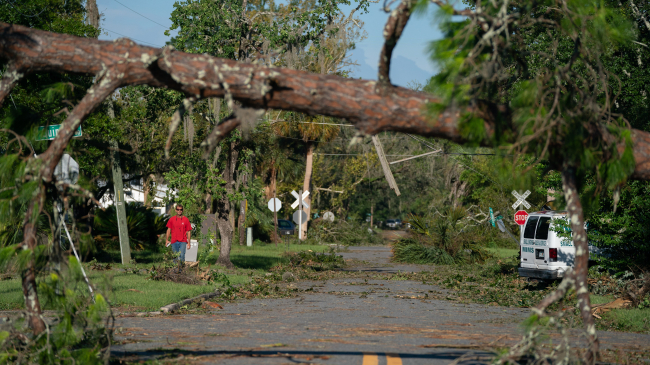Volunteers collect indices of heat exposure and thermal images of surfaces in a Charleston, South Carolina, community. (Image credit: NOAA)
NOAA and partners in Las Vegas, Phoenix, Miami, and Charleston, South Carolina are launching an 18-month project to help communities pinpoint local impacts of extreme heat. The pilot project, “Building Equitable Resilience to Extreme Heat,” will support state and local initiatives designed to reduce the negative health effects of extreme heat events, especially for disproportionately affected populations.
Extreme heat is one of the leading causes of weather-related illness and death in the United States, causing more fatalities in a typical year than hurricanes, tornadoes, severe storms and floods. As climate change continues to increase the likelihood of weather extremes, the impacts of heat on communities — especially on their most vulnerable citizens — is likely to worsen.
“Known as a silent killer, extreme heat can cause increased health risks, especially for those without the resources to prepare for and mitigate its effects,” said Deputy Secretary of Commerce Don Graves. “This project builds on the Department’s commitment to equity by working with communities to ensure such resources are tailored to local needs.”
With a fiscal year 2022 investment of $187,800, NOAA is supporting activities in each of the four cities. The work in each city is specific to local needs and includes heat monitoring; summarizing existing heat-related activities; planning exercises to better understand roles and responsibilities of federal and community stakeholders both during extreme events and to support cross-sector planning for increased heat on multiple time scales; and identifying heat risk reduction strategies.
“Working hand-in-hand with partners in cities affected by extreme heat will help connect NOAA’s climate information and resources to those who need it most,” said NOAA Administrator Rick Spinrad, Ph.D. “This close collaboration and knowledge sharing is a key part of building a Climate-Ready Nation.”
Key partners in each location provide critical expertise and input.
Southern Nevada’s collaboration with NOAA is helping advance recent efforts initiated to address the warming climate and alleviate its impacts on our community, especially among those most vulnerable to extreme heat,” said MJ Maynard, CEO of the Regional Transportation Commission of Southern Nevada. “The opportunity to learn from experts in the industry and peer cities has been invaluable as we work to better understand the full impact of extreme heat on our community.
Protecting public health during our long and hot summers and cooling our hottest neighborhoods are among the greatest resilience challenges facing Phoenix,” said David Hondula, Director, Office of Heat Response and Mitigation, City of Phoenix. “Working closely with NOAA, Las Vegas, Charleston, and Miami is going to help us meet those challenges. We’ve already seen positive changes to our planning efforts for 2023, and are looking forward to many more positive outcomes in the months ahead.
Health risks to Charleston citizens and ways we can mitigate current and future heat-health risks need to be better understood and incorporated into city planning and projects,” said Dale Morris, Chief Resilience Officer, City of Charleston. “Our NOAA funded heat-health pilot puts us firmly on the path towards heat-health understanding, planning and investment. Learning heat-health outcomes from the other pilot cities is an important added benefit to City leaders and staff.
The NOAA pilot project has enabled our university partners to fill in critical gaps in our urban heat island data collection, specifically targeting bus stops, schools and residential neighborhoods with high energy burden,'' said Jane Gilbert, Chief Heat Officer, Miami-Dade County. “We are excited for the analysis of this data to inform the planning exercise and accelerate our collective work. We're also grateful to have the opportunity to learn and share from the other communities participating in the pilot.
Project outcomes will include:
- Information and maps that identify areas of greatest heat exposure and combine heat exposure information with other characteristics related to vulnerability (such as energy poverty).
- Summary reports from heat resilience exercises that clarify roles and responsibilities and provide recommendations for improved community resilience to extreme heat.
- Opportunities to improve collaboration and services to better address heat health for disproportionately affected populations.
- A guidance document for engaging municipal government partners on heat health resilience.
- Improved evidence for implementing community-based solutions that reduce heat-health risks at multiple time scales.
The heat health pilot builds upon and extends efforts by the NOAA and CDC-led National Integrated Heat Health Information System (NIHHIS) to reduce the health impacts of extreme heat and develop equity-focused data and tools like Heat.gov. This project is also responsive to the Biden-Harris Administration’s Executive Order on Tackling the Climate Crisis at Home and Abroad.
The pilot project is one of seven across the nation developed in response to NOAA’s 2021 Climate and Equity Roundtables. Roundtables held in the Southeast and Southwest provided an opportunity for NOAA leadership to hear from community partners to determine how to better connect them with NOAA’s climate data and information and enhance their understanding of climate change impacts and adaptation, especially for those who live and work with increased exposure to extreme heat. The pilots take a unique, place-based approach to helping disproportionately affected communities better understand, prepare for and respond to climate change.
Learn more about extreme heat, other pilot project announcements and NOAA’s environmental justice efforts.
Media contacts
NIHHIS: Morgan Zabow, morgan.zabow@noaa.gov, NIHHIS Communications and Outreach Coordinator
NOAA Communications: Monica Allen, monica.allen@noaa.gov




